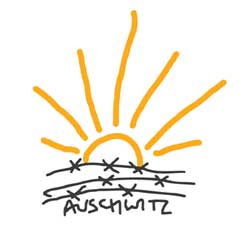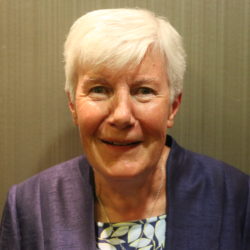At the Edge of Auschwitz
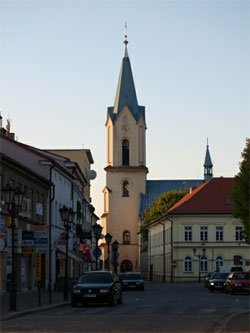
Auschwitz is the German name for the town of Oswiecim which is in the south of Poland. For twelve years I lived and ministered 3 kms from the town at the Centre for Dialogue and Prayer. This Centre is located at the edge of the former German Nazi Concentration and Extermination Camp Auschwitz. I was often asked, “How could you live in such a place”? For me to have lived and served there was profound, challenging, meaningful, and rooted in the charism of Mercy.
Auschwitz is no more thank God. The past is Memory and the Memory of victims is honoured in the Centre in the accompaniment of people to the camps, hospitality, reflections, retreats, conferences and seminars. I was part of this work. Positive experiences are offered for guests, and groups, so that people return home with a sense of hope and life and a belief in the dignity, beauty and value of each person. Otherwise, the power of evil rather than the power of Love would have the last word.
The Centre for Dialogue and Prayer was founded in 1992 by Archbishop of Krakow Franciszek Cardinal Macharski in agreement with the bishops of Europe and with representatives of Jewish organizations. It is a guest house open to everyone irrespective of language, nationality, religion, gender. The Centre wants to commemorate the victims and contribute to creating mutual respect, reconciliation and peace in the world.
 Everything here starts with silence and listening
Everything here starts with silence and listening
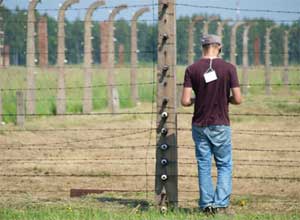 The Centre offers four dimensions to enable guests engage with Auschwitz
The Centre offers four dimensions to enable guests engage with Auschwitz
Listen to the Voice of the Earth – Learning the Facts
What happened in Auschwitz? The Centre helps both study groups and individuals to organise their stay in cooperation with Museum Auschwitz and with survivors. Over 1 million Jewish people were murdered in Auschwitz. There are no graves. The ashes of the people were thrown in the local rivers, ponds or used for fertilizer. The Jewish people were selected by the Nazis for extermination simply because they were Jews. Jews in every country of Europe were listed for extermination including the Jews of Ireland. 75,000 Polish people, 23,000 Sinti Roma, 15,000 Soviets and 220,000 Jewish people were selected first as slave labourers before they died. Death came from starvation, cruelty, punishments, disease, and appalling living conditions.
Listen to the Voice of your Heart – Reflection Time
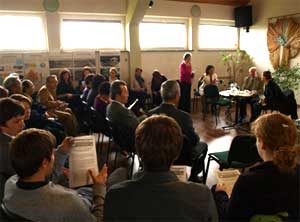
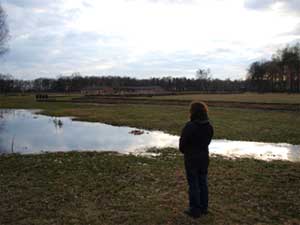
What does the memory of Auschwitz mean to me? The atmosphere of the Centre is helpful for reflection and the exchange of thoughts and education for both individuals and study groups. In the Centre questions can be raised in an environment of trust: How could this have happened? Could it happen again? Who would I have been then? Who am I today? Would I have shared my bread or would I have stolen bread from another prisoner? Would I have kept faith or lost faith? These are questions that are addressed and they are questions that continually invite a personal response from me.
Listening To The Voice Of The Other – Dialogue
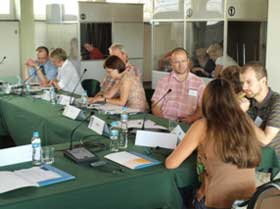
What does the memory of Auschwitz mean to people? The Centre organises international and interreligious conferences and seminars so that the “After Auschwitz” questions can be explored from many perspectives. Participants from Israel, Germany, Poland, and many other countries come for these events. Guests are offered a guided walk in the city of Oświęcim to get an insight into life there in the past and the present. Meetings with local youth are also arranged.
Listening to the Voice of God – Prayer
In Auschwitz the question, “Where was God”? is ever present. Maybe God also asks us: “Where were you and where are you today?” For me there are no easy answers to such questions. Some prisoners lost their faith while for others faith sustained their sense of humanity and their belief in a God who suffered with them. The painful history of Jewish Christian Relations is also raised, retreats are organized and a framework for prayer is suggested for Birkenau.
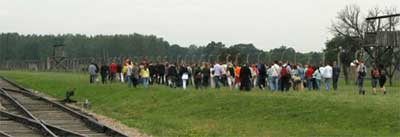
Auschwitz remains an open wound. The challenge is to empower life around the wound. Auschwitz presents every person, every victim, every perpetrator, every bystander, every church, every nation with choices and decisions to create “after Auschwitz” a civilization of love.
You might consider a visit to the Centre for Dialogue or visit our website.
